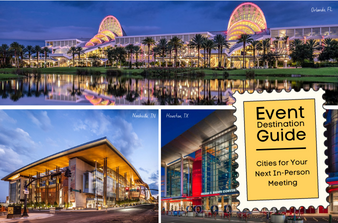The results are in from our recent survey of meeting organizers and event professionals at our Plan V: Hybrid Homerun broadcast. We asked some top questions around how organizations are planning on programming their events for the rest of 2021 and into next year and we’re sharing the facts and figures from our survey findings, as well as helpful resources for event success.
What Are Organizations Planning for 2021?
For meeting organizers and event professionals, the remainder of 2021 will be a time to experiment with their event strategies moving forward. The virtual meeting era from 2020 into the first half of 2021 has opened eyes into the pros and cons of different event types. For example, in-person events offer face-to-face engagement that just can’t be replicated on screen, while virtual events present people with the opportunity to connect with your event from anywhere in the world. And hybrid events offer many of the benefits of both!
All of that considered, 75% of organizations are planning to host a combination of event types as they navigate the ever-evolving new world of events. Despite all of our excitement to get back to in-person events, uncertainty over in-person gatherings remains — as just 3% of organizations plan to go back to fully in-person events. Yet, even with the uncertainty, given the choice between fully in-person or virtual-only events, in-person just edges out virtual, which was selected by 2% of participants.
The hybrid event approach, which incorporates elements of in-person and virtual events, was favored by 16% of people surveyed.
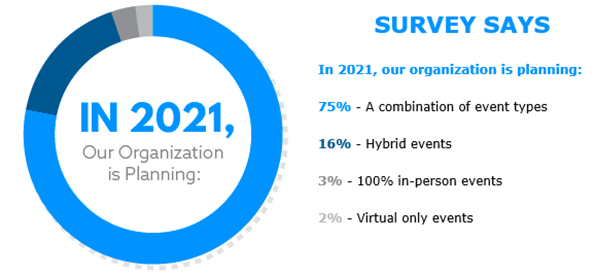
What is your organization planning for 2021?
Factors Driving Event Strategy
Attendees’ ability to travel is the leading driver of event strategy, with 73% of respondents indicating that it will play a key role as they’re planning their upcoming events. While domestic travel is no longer the barrier it was in 2020, events looking to attract international attendees are likely to be hindered by varying restrictions traveling to and from certain countries. Such is the uncertainty of the pandemic, which 46% of organizers and professionals say is driving their event strategy.
Event budgets and costs look a little different this year based on industry professionals not knowing whether we’d be able to go back to events as normal or if the virtual-only era would continue into 2022. As such, budget and costs remain driving factors for 42% of respondents. Even with meetings trending back to in-person, there’s still a market for virtual events, with 12% of respondents stating their preference for this format.
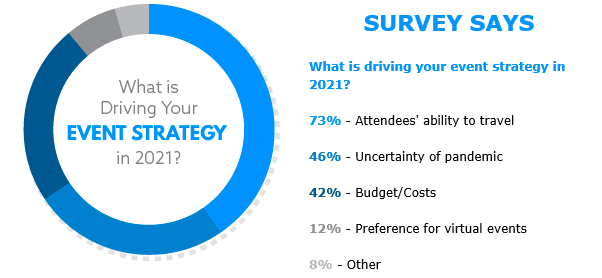
While virtual events provide a different experience from in-person, their benefits can’t be overlooked. As mentioned earlier, people can attend from anywhere in the world. Organizations planning virtual events can also lower their costs and aren’t subject to the latest in-person meeting guidelines. To add to that, if an organization is planning on bringing a speaker in for the event, they’ll have more options, as bigger name speakers are likely to participate in a virtual event at more economical rates since travel and accommodations are no longer needed.
What’s driving your event strategy in 2021?
- Learn more about 10 factors that will determine your virtual event budget
- Discover three ways to stretch your live event’s budget
How Is Virtual Being Integrated?
The majority of meeting planners and event professionals are planning to keep it basic when it comes to integrating virtual elements into their meetings, according to our 2021 virtual event statistics. Based on the survey, 58% plan on streaming their session to a virtual audience. There are several other hybrid formats planners can choose from, including the on-demand experience, which allows registrants to view the sessions and content post-event. The survey indicates that 21% of people plan to go this route for their hybrid events.
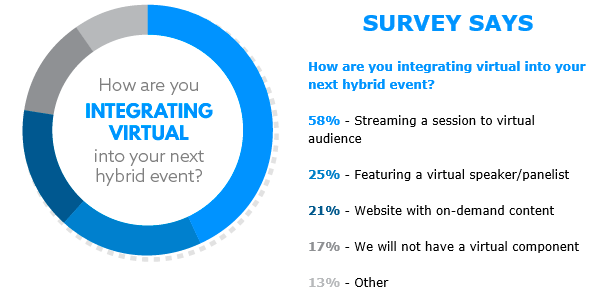
We mentioned previously that events that are fully or partially virtual open up possibilities when it comes to speakers, and 25% of the people surveyed plan to take advantage by bringing in a virtual speaker or panelist.
Having a virtual component isn’t in the plans for 17% of respondents, meaning they’ll be forgoing hybrid altogether and putting all their energy into their in-person events.
A further 13% have indicated they’ll be integrating virtual into their events in other ways, giving them additional opportunities to get creative with hybrid event formats.
How are you planning to integrate virtual into your next hybrid event?
What’s Next for Virtual?
Overall, people still see the value in fully virtual events, with 62% saying they plan to host one in 2022. Still, 35% remain undecided, but only 4% are saying “no” to going virtual in 2022, likely in hopes that by then, virtual will be a supplement rather than a necessity. For the majority, though, virtual is a necessity and will be part of their event strategies in 2022 and beyond.
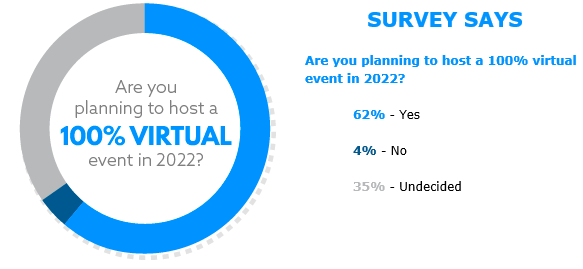
Are you planning to host a virtual event in 2022?
- Click here for steps on how to host a virtual event
- Click here for a virtual event planning roadmap
- Check out our detailed comparison of virtual and hybrid event platforms
- Learn how to implement gamification to engage virtual attendees
LAI Live Can Help Make Your Next Event a Success
Our team of experts can help your organization create the best experience for attendees, no matter the format of your event. Contact us to start exploring the potential for your next meeting.

